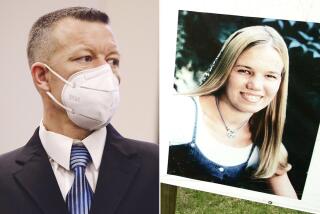Elizabeth Smart’s abductor guilty of kidnapping, rape
Eight years ago she was a symbol of stolen innocence, snatched from her bedroom at age 14, chained up and raped for nine months before being rescued.
On Friday, Elizabeth Smart, now 23, symbolized something else in a federal courtroom in Salt Lake City -- resilience. She watched a jury convict her kidnapper, the culmination of a long legal battle that featured Smart’s calm, methodical testimony about the unspeakable things that Brian David Mitchell did to her during her captivity.
“The beginning and end of this story is ... a woman with extraordinary courage and extraordinary determination,” Acting U.S. Atty. Carlie Christensen told reporters after the verdict was read. Smart recounted her travails, Christensen said, “with a candor and clarity and a truthfulness that I think moved all of us. She is a remarkable young woman.”
Later, Smart spoke to reporters outside the courthouse. “I hope that not only is this an example that justice can be served in America, but that it is possible to move on after something terrible has happened,” she said.
The abduction of Smart -- petite, blond and a member of a devout Mormon family -- attracted worldwide attention and an outpouring of prayers for her safe return. The circumstance of her disappearance -- taken as her parents slept -- added to the horror, and her rescue prompted perhaps an even larger outpouring of relief and joy.
After five hours of deliberation, the jury found Mitchell, 57, guilty of transporting a minor across state lines for sexual exploitation and interstate kidnapping. He could face life in prison and is scheduled to be sentenced May 25.
Mitchell’s attorneys never denied the allegations against him. “You do not have a good man here,” Robert Steele, one of his lawyers, told jurors during closing arguments.
But his attorneys contended that Mitchell -- who said that God ordered him to abduct Smart and rape her -- was clinically insane and should not be convicted for his acts.
Prosecutors said that Mitchell, who had used an insanity defense to avoid a conviction in state court, was only play-acting. A gaunt man with an unruly gray beard, Mitchell regularly broke into song during the trial, which led to him being exiled to a cell, where he watched testimony via video. On Friday, as the verdict was announced, Mitchell sang a Mormon hymn called “He Died. The Great Redeemer Died.”
Outside court, his stepdaughter, Rebecca Woodridge, who herself had been sexually abused by Mitchell decades ago, told reporters she thought his mental illness meant he could not be held legally responsible for his actions. “There’s a difference from knowing what you’re doing is wrong and continuing to do it, and knowing what you’re doing could be wrong but not being able to stop it,” she said.
On the night of June 4, 2002, Smart testified, she woke with Mitchell standing over her, a knife to her throat. He threatened to kill her family if she did not go with him. He took her from her family’s Salt Lake City home into a canyon in the Wasatch Mountains, where his then-wife, Wanda Barzee, awaited them.
Mitchell took Smart as a “plural wife” and began raping her, telling her it was God’s will and preaching a twisted version of Mormon theology. He and Barzee locked a cable around Smart’s leg and chained it to a tree. She spent months living in primitive conditions, and was raped multiple times a day. As winter neared, Mitchell moved them to the hills east of San Diego.
In California, Mitchell was arrested for breaking into a church while high on prescription drugs. He didn’t get out of jail for a week, and Barzee and Smart survived by drinking rainwater.
Smart’s recounting of the California leg of their journey showed how, even then, she maintained her poise and wits. She used religion against her tormentor and told Mitchell that she thought God was calling them back to Salt Lake City, and he agreed to return there.
As she testified in a 2009 hearing on whether Mitchell should stand trial, she said, “California, I felt that was so far away. I felt that no one would ever find me. Even if it took 20 years to find me I thought the chances would be better in Salt Lake.”
The tactic worked. Several weeks later, a biker spotted Mitchell and Barzee walking with a girl in a Salt Lake City suburb. By then Mitchell, who had done odd jobs for Smart’s parents in the past, had been identified as a suspect in her disappearance.
Smart was with him, dressed in a wig and sunglasses. She testified that she was so scared of Mitchell she initially didn’t identify herself to police when they picked her up.
Barzee and Mitchell were found mentally incompetent to stand trial by state courts and were held at a psychiatric hospital. Federal authorities took over the case and were able to get Mitchell declared competent at a federal court hearing last year. Barzee soon pleaded guilty and was sentenced to 15 years in prison.
Now 65, Barzee testified against Mitchell, calling her ex-husband a “great deceiver.” The two had spent years wandering the country as street preachers before the kidnapping.
Barzee, who along with Mitchell had belonged to the Church of Jesus Christ of Latter-day Saints, said he manipulated her religious beliefs to get her to go along with the kidnapping. She testified that he had claimed to have had a divine revelation years earlier that God wanted him to take multiple brides.
Smart’s testimony lasted for three days, but much of the trial was taken up by dueling experts discussing whether Mitchell was mentally competent.
Smart calmly sat through much of the trial, though she and her mother stormed out of court when one state psychiatrist testified that she had picked out baby names during her captivity in case she became pregnant.
After the verdict, however, Smart and her parents spoke triumphantly to a crush of reporters.
“This is an exceptionally victorious day for all of us,” said Lois Smart, Elizabeth’s mother.
Elizabeth Smart, who is on a break from her Mormon mission in France, said she hoped other victims of sex crimes and abductions would take heart from the verdict. “We can speak out,” she said, “and we will be heard.”
Until Mitchell’s trial, Smart had remained largely out of the public eye and embarked on her mission work in Europe.
But last year she appeared on CNN to offer advice to Jaycee Lee Dugard, who was discovered 18 years after being kidnapped from South Lake Tahoe.
“I would just encourage her to find different passions in life and continually push forward and learn more and reach more for them,” Smart said, “and not to look behind, because there’s a lot out there.”
--
nicholas.riccardi@latimes.com
More to Read
Start your day right
Sign up for Essential California for news, features and recommendations from the L.A. Times and beyond in your inbox six days a week.
You may occasionally receive promotional content from the Los Angeles Times.






